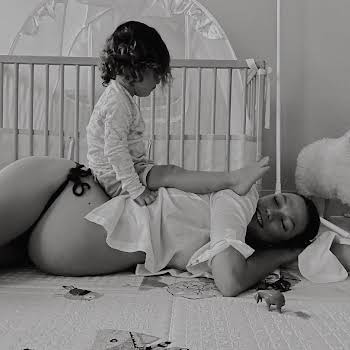
Why are so many mothers in discomfort, even months after giving birth?
By Amanda Cassidy
15th Jan 2024
15th Jan 2024
Solicitor Niamh Ní Mhurchu speaks to us about the inadequate care for new mums especially those with post-birth injuries.
“Picture the scene”, says Niamh. “You’re in a group of people, in a career or social setting (I know, it’s been a while, but work with me here) and you can’t control your flatulence, or even worse, you can’t control soiling yourself.
Some women still find themselves in these situations as a result of injuries sustained while giving birth. The social taboo is so great, they are afraid to even leave the house and feel incredibly isolated.”
Niamh, who is joint managing partner at Callan Tansey Solicitors, asks why, in 2024, are so many mothers in so much discomfort, even months after giving birth? When did we think it was acceptable to suffer in silence?
“This should have been a joyous event in my life, as the first two births had been, but I felt it was unnecessarily turned into a terrifying and traumatic event by poor care.”
Tear
Sarah* had her daughter four years ago after a long and traumatic birth. She says she was appalled there was such little emphasis on her care, even months after the event.
“There was no euphoria as there had been with my two other children. I was in shock, shaking and unable to hold her. She was screaming and wouldn’t latch on to feed. We were both traumatised.
“I ended up having a 3b tear with sphincter damage. This was the worst tear I had experienced in childbirth, even though this little one was not my biggest baby and this was my third labour. I felt broken. I then had to wait hours without pain relief to have surgery, and experience the pain of a doctor checking with his hand to see how bad the tear was. At this stage, I felt like I was being treated like some kind of animal.
“I did not feel safe or supported just scared, alone and ignored.”
“Even now, I experience pain and scar tissue. This should have been a joyous event in my life, as the first two births had been, but I felt it was unnecessarily turned into a terrifying and traumatic event by poor care.”
Mind the Gap
Niamh had the experience of being pregnant and giving birth in both Ireland and Canada. She says the difference in experience was incomprehensible.
“Compared to Canada, Ireland is lagging far behind when it comes to maternity care. Once you have your baby in Ireland, you’re given an appointment to be seen in six weeks by your Obstetrician or the hospital, a public health nurse comes to visit but my experience has been that these visits are primarily focused on the baby.
“In Canada, you can choose to access the services of a community midwife who will visit almost every day for the first three weeks, then it drops down to every couple of days up to the six-week mark. The midwife will examine mum frequently and check on how things are healing.
“This means that there is swift intervention if an issue surfaces. There is also continuity in that the midwife who was involved in your antenatal care has a continuing role post-partum and enormous goodwill and trust has been built up.”

Follow-up care
The lack of after-birth follow-up in Ireland means that women can experience significant injuries and have no idea that what they’re feeling isn’t normal.
The last place a new mum wants to find herself is in a busy A&E separated from her tiny baby who she may be trying to feed herself but that is often the reality for new mums when things start to go wrong after they have been discharged home.
“I have had clients come to me who were waved off by medical staff and told, “That’s normal, you just had a baby”. These women know they don’t feel normal. They feel they haven’t been properly examined or listened to and weeks and sometimes even months later, they realise that what they are experiencing is much more serious and by the time they are referred to a women’s health physiotherapist, etc., much time has already been lost.”
“If a woman has a significant tear that has left her incontinent, she needs access to a bathroom at very short notice.”
Everyone agrees that when it comes to any disability, early intervention is key. The humiliation, frustration, and upset they feel at not being listened to and being “fobbed off” is what leads them down the legal route. In fact, clinical negligence cases relating to maternity care in Ireland make up more than 50% of payouts made by the state.
Yet maternity services account for only 3% of the HSE budget. The state and its women would be better served by increased investment in maternity services, which in turn could lead to a reduction in birth and obstetric injuries and resultant claims.
Let down
“Women find it difficult to open up about their issues as nobody likes to talk about bowel movements, bladder leakage or the inability to have sex,” explains Niamh. “I know of women who could not return to work because of their injuries. If a woman has a significant tear that has left her incontinent, she needs access to a bathroom at very short notice.
I have known teachers, chefs, hairdressers, bank officials who have had to abandon their chosen careers because their jobs mean they cannot abandon a client, a boiling pot or a classroom at a moment’s notice.
Women in such situations know it’s affecting their long-term prospects. By the time women come to me, they feel they have been let down by the system. They have ended up with an injury that has affected their day-to-day life and they are looking for answers as to how things went so wrong.”
Niamh agrees, along with many in the medical professions, that pregnancy should be viewed as 12 months and not nine months.
Long-term
“The fourth trimester and continuing care throughout the fourth trimester are key. Continuing care past the nine-month mark means early intervention for any injuries requiring medical assistance. It means that women will get swifter access to physiotherapy and other supports. I have worked with women who have a perfect baby but due to the injuries that they’ve sustained, they’re unable to hold him or her.”
This should not be happening in Ireland. For many, the opportunity to have their concerns addressed, to be listened to and understood would have been invaluable. For others, an early intervention to address traumas, injuries and life-impacting outcomes would have been transformative.
Sarah says she wished she’d pushed for more access to care in the months after her daughter’s birth. “It was all about the baby, which I was obviously thankful for, but it was as if my injury didn’t matter. Even now, I can’t fully control my body and sex is often painful. Even saying I had a tear with sphincter damage was taboo. It still is.”
Niamh says now more than ever, it is vital that we give women the opportunity to voice their concerns around their childbirth experience to ensure that they are listened to, heard, and fully supported; “The system of maternity care needs to change. The first step is listening to women and validating their experiences.”
This is an updated version of an article that was originally published in August 2021.























